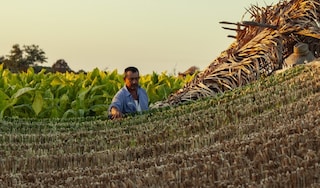
Our 2025 Roadmap goals
see our full 2025 roadmapIMPROVE THE QUALITY OF LIFE OF PEOPLE IN OUR SUPPLY CHAIN
Eradicate systemic child labor in our tobacco supply chain.
Ensure all contracted tobacco farmers make a living income, partner with our direct suppliers to promote a living wage for their workers.
Key performance indicators to track our progress
In 2024, child labor prevalence affected 0.01 percent of our purchased tobacco and, while we broadly eradicated systemic child labor issues in the farms we contract with, we remain committed to eradicating isolated cases.*
*For further details on how we calculate the prevalence of child labor in PMI’s tobacco supply chain, please see PMI’s Sustainability KPI Protocol 2024.

See full performance metrics
view dataLearn more about PMI’s Sustainability Index in our Integrated Report 2024. See the full performance metrics and related footnotes here.
The right thing to do
Promoting and adhering to sustainable business practices in our direct and indirect operations helps safeguard human rights, improve labor conditions, protect workers' health and safety, tackle social inequities, and contribute toward alleviating poverty.
Read moreThe business case
Caring for the quality of life of the people in our supply chain is a major contributor to our preparedness, resilience, and long-term success.
read more
Our progress in 2024
Read more in our Integrated ReportThis online content about our Integrated Report should be read in conjunction with PMI’s Integrated Report 2024. This report includes metrics that are subject to uncertainties due to inherent limitations in the nature and methods for data collection and measurement. The precision of different collection and measurement techniques may also vary. This report includes data or information obtained from external sources or third parties. Unless otherwise indicated, the data contained herein cover our operations worldwide for the full calendar year 2024 or reflect the status as of December 31, 2024. Where not specified, data comes from PMI financials, nonfinancials, or estimates.
Unless explicitly stated, the data, information, and aspirations in this report do not incorporate PMI’s wellness and healthcare business, Aspeya. Regarding the Swedish Match acquisition, completed late 2022, unless otherwise indicated, this report includes information pertaining to its sustainability performance. Please also refer to "This report at a glance" on page 2 of the PMI’s Integrated Report 2024 for more information. Aspirational targets and goals do not constitute financial projections, and achievement of future results is subject to risks, uncertainties and inaccurate assumptions, as outlined in our forward-looking and cautionary statements on page 206. In PMI’s Integrated Report 2024 and in related communications, the terms “materiality,” “material,” and similar terms are defined in the referenced sustainability standards and are not meant to correspond to the concept of materiality under the U.S. securities laws and/or disclosures required by the U.S. Securities and Exchange Commission.







